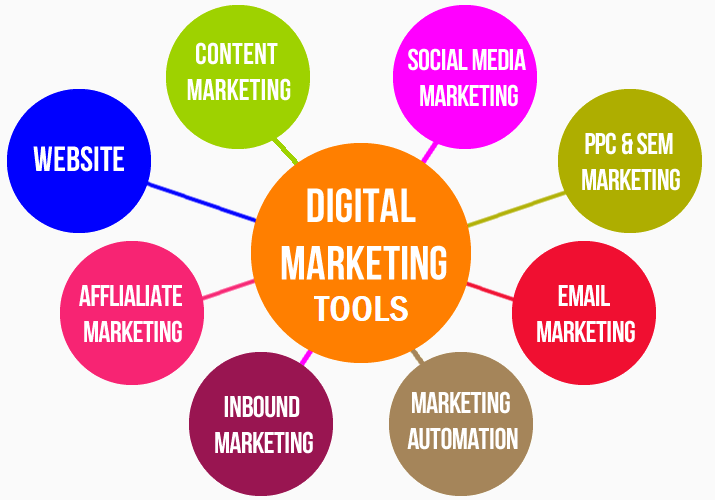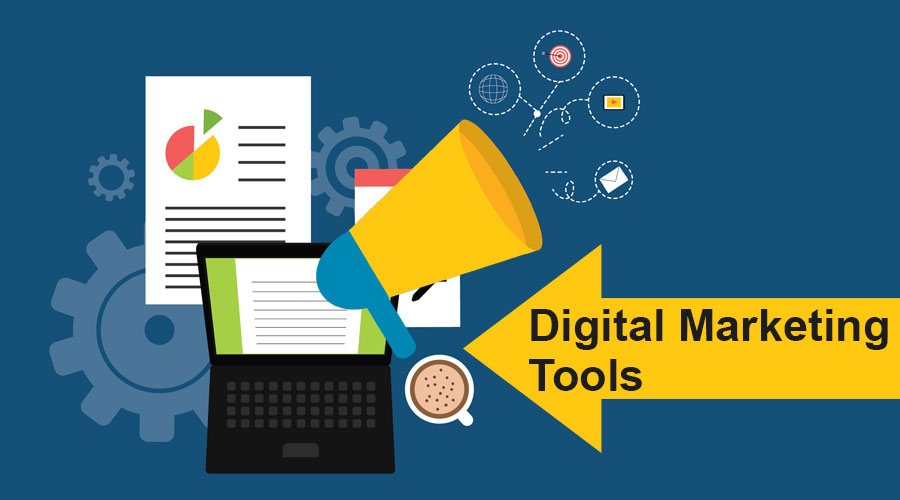In today's fast-paced digital world, the success of any business depends on using digital marketing. To do that, businesses need to stay updated with the latest technology and trends, and use the right tools to reach their target audience. These digital marketing tools come in handy.
Think of digital marketing tools as your secret weapons for business growth. They offer a variety of powerful options to improve your online presence, engage customers, and get real results. However, However, with so many tools available, it can be difficult to choose the right ones.
But fret not! In this guide, we'll take you on a journey into the world of digital marketing tools, using simple and easy-to-understand language. We'll explore different types of digital marketing tools, explain what they do, and showcase some of the top tools that can revolutionize your online marketing efforts.
Related : 6 Tools To Get You Started Fast in Social Media

10 Best Digital Marketing Tools for Your Small Business
In today's digital age, small businesses need to harness the power of digital marketing to reach their target customers and grow their business. Thankfully, there are plenty of user-friendly and affordable digital marketing tools available to help them achieve their goals. Here are the top 10 best digital marketing tools specifically designed for small businesses:
- Google Analytics: A free tool that provides valuable insights into website traffic, visitor behavior, and conversions.
- Mailchimp: An easy-to-use email marketing platform that helps businesses create and send professional-looking emails to their subscribers.
- Hootsuite: A social media management tool that allows businesses to schedule and manage their social media posts across different platforms.
- Buffer: Similar to Hootsuite, Buffer helps businesses schedule and publish social media content effortlessly.
- Canva: A graphic design tool that enables small businesses to create eye-catching visuals for their social media posts, blog images, and more.
- Moz: An SEO tool that assists businesses in optimizing their website for search engines, improving their online visibility.
- SEMrush: Another powerful SEO tool that provides comprehensive keyword research, competitor analysis, and website auditing features.
- BuzzSumo: A content discovery tool that helps businesses find popular and trending content in their industry, allowing them to create engaging content for their audience.
- WordPress: A user-friendly platform for building and managing websites, offering customizable templates and plugins to enhance online presence.
- Sprout Social: A social media management and analytics tool that allows businesses to monitor their social media performance and engage with their audience effectively.
By leveraging these tools, small businesses can streamline their marketing efforts, reach their target audience, and achieve remarkable online success.
Don't Miss : Why Marketers Need Ai Made For Marketers in Digital Marketing?
What are the 7 Elements of Digital Marketing?
To create effective digital marketing campaigns, it's essential to understand the key elements that make up this approach. Here are the seven fundamental elements of digital marketing explained in simple language:
- Website: A business needs a website where people can learn about them and take action, like buying something or getting in touch.
- Content Marketing: This means creating and sharing helpful information like blogs, videos, or social media posts to attract and engage people.
- Search Engine Optimization (SEO): SEO helps businesses show up higher on search engines like Google by making their website content and structure better.
- Social Media Marketing: Using platforms like Facebook, Instagram, and Twitter to connect with customers, build awareness, and have conversations.
- Email Marketing: Sending targeted messages to people who are interested in a business through email. It helps build relationships, promote products, and get people to take action.
- Pay-Per-Click (PPC) Advertising: This is when businesses display ads on search engines or social media, and they only pay when someone clicks on their ad. It's a cost-effective way to reach the right people.
- Analytics and Reporting: Using tools to see how well digital marketing is working. Businesses can track website traffic, measure success, and make smart decisions based on data.
Understanding these seven elements of digital marketing helps businesses create effective online strategies. By using them wisely, businesses can reach the right audience, build their brand, and achieve success in the online world.

10 Tips for Choosing the Right Digital Marketing Tools
Picking the right tools for digital marketing can make a big difference in your success. Here are ten simple tips to help you choose wisely:
- Know what you need: Figure out your goals and the tasks you need help with.
- Do your research: Look at different tools, compare their features, read what others say about them, and check the prices.
- Consider your budget: Decide how much you can spend and find tools that give you good value for your money.
- Easy to use: Choose tools that are easy to understand and don't require too much technical knowledge.
- Can grow with you: Make sure the tools can handle your business's growth and increased needs.
- Work well with what you have: See if the tools can connect with your existing systems and make your work smoother.
- Get support when you need it: Pick tools that offer good customer support and helpful resources.
- See what worked for others: Read about real stories of businesses that used the tools you're considering to see how well they worked.
- Ask for advice: Talk to people in your industry or online communities to get recommendations from others who used the tools.
- Try before you buy: Many tools offer free trials or demos. Take advantage of them to see if they fit your needs.







